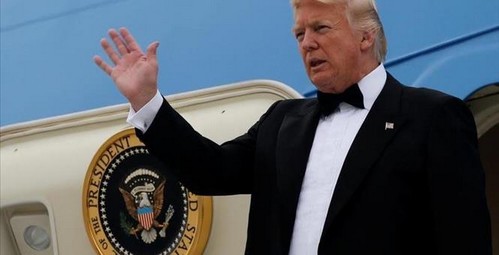Could Trump Become Education’s Great Liberator?
President Donald Trump may receive little or no credit anytime soon from within the public-education establishment for potentially easing the dead weight of federal mandates from the pursuit of learning in classrooms across the country. Eventually, though, he might—if his executive order (EO) of April 26 stays true in making it the executive branch’s policy to “protect and preserve State and local control over the curriculum, program of instruction, administration, and personnel” of schools and other educational institutions.
Cynicism flows easily when executive orders proliferate during the first 100 days of a presidency. A Democratic National Committee spokeswoman expressed a jaded political perspective in asserting that the purpose of the Trump EO is not to help students or education but rather to cover for his lack of real accomplishment.
In contrast, the folks who protect the right of parents to educate their children at home without governmental obstruction, and therefore track federal intrusions like hungry hawks, see Trump’s directive to the executive branch as historically significant. “Unprecedented” and “unique” were the precise words William Estrada, director of federal relations for the Home School Legal Defense Association, used to characterize this particular EO.
“Past Presidents – from both political parties – have often used such directives to increase federal control over various aspects of society, including education,” Estrada noted on the HSLDA website. “Whenever the federal government increases its role in education, children suffer, as bureaucrats far removed from parents, teachers, and locally elected school boards exert their will over how our students are educated.”

Trump’s EO directs U.S. Secretary of Education Betsy DeVos to review all her department’s regulations and guidance documents (such as the infamous “Dear Colleague” letters beloved by the Obama administration) to see if any violate existing federal laws prohibiting the U.S. Education Department (USED) from dictating local/state education policy. The EO even mentions by name the Common Core standards, the continued existence of which seems to be well known to practically everyone except DeVos. “There isn’t really any Common Core anymore,” she remarked in an April 24 interview with Fox News’ Bill Hemmer.
Within 300 days, the secretary of education must “rescind or revise” all illegal (not to mention unconstitutional) USED regulations and ukases. A reasonable expectation would be that many of them will be gone much sooner than that. On February 22, little more than a month after the presidential inauguration, the Trump administration revoked an Obama directive that had compelled schools to let transgender students automatically use restrooms matching their gender self-identification.
A reason for optimism as to results of the Trump-ordered regulatory review is that it will be led by Robert Eitel, who may well be the best friend of limited government in a DeVos inner circle otherwise heavily populated with folks who collaborated with former Florida Gov. Jeb Bush (R) in pushing Common Core. Formerly the second-ranking USED lawyer in the George W. Bush administration and now a senior counselor, Eitel co-authored an incisive 2012 Pioneer Institute report, “The Road to a National Curriculum,” that identified existing (though largely ignored) federal laws barring federal direction, supervision, and control of instruction or curricula.
That study zeroed in on how Obama-funded assessments aligned with Common Core and developed by two consortia hugely influenced K–12 curricular content and teaching methods. Given that the Every Student Succeeds Act continues to require states to conduct assessments and submit their standards for federal approval, it is reasonable to suspect Common Core’s malign influence lingers. Viewed hopefully, the Eitel taskforce will root it out.
Although education progressives (judging by their paper-of-record, Education Week) deplore the cuts Trump is proposing in several federal-aid programs, it is fascinating how commonly teachers’ letters of resignation cite the intrusion of top-down mandates as a source of frustration causing them to exit teaching. In a study titled “With Regret: The Genre of Teachers’ Public Resignation Letters,” researchers at Michigan State University’s College of Education analyzed 22 “I Quit” letters that went viral. The shared disillusionment is quite striking.
A 40-year teaching veteran and social studies department leader in Syracuse, Gerald J. Conti, expressed his disgust with “‘data-driven’ education [that] seeks only conformity, standardization, testing, and a zombie-like adherence to the shallow and generic Common Core, along with a lockstep of oversimplified, so-called Essential Learnings. Creativity, academic freedom, teacher autonomy, experimentation, and innovation are being stifled in a misguided effort to fix what is not broken in our system of public education.” Conti also slammed local lawmakers who “in their pursuit of federal dollars [have] failed us by selling children out to private industries such as Pearson Education.” (Pearson is a publisher of Common Core materials.)
A Cambridge, Massachusetts kindergarten teacher, Suzi Sluyter, said she quit after 18 years because job requirements had “swung away from a focus on the children, their individual learning styles, emotional needs, and their individual families, interests, and strengths to a focus on testing, assessing, and scoring young children, thereby ramping up the academic demands and pressures on them.” She described the distress of many 5-year-olds who couldn’t handle the convoluted material being pushed down on them in accordance with Common Core doctrine.
The study (whose lead author is Alyssa Hadley Dunn) interestingly concluded the destructive trends experienced by teachers are attributable to “neoliberalism, or a political and educational ideology that emphasizes marketization, competition, privatization, and capitalism.” It continued: “At the school level, neoliberalism appears in, among other recent moves, the Common Core State Standards, high-stakes testing, union busting, charter schools, voucher programs, merit pay initiatives, value-added models of teacher evaluation, and short-term teacher training, all of which seek to increase competition within and across schools.”
Well now, those assertions provide fodder for extended discussions another day. Suffice to say, Common Core has nothing to do with choice or competition. It is about pushing a one-size-fits-all scheme on children without regard to individual differences or diverse teaching styles. To the extent that big business and Chamber of Commerce types have bought into this statist or socialist model, they have practiced corporatism, not capitalism (and shame on them). Real school choice (as opposed to phony choice within mandated Common Core) offers teachers, students, and parents a chance to thrive in an atmosphere of shared trust and respect.
No doubt it is too mind-blowing for the Michigan State ed-schoolers to credit business tycoon Donald Trump for busting up an oppressive education scheme. However, to borrow from the Rodgers and Hammerstein take on “The Farmer and the Cowman” in the musical Oklahoma!, the progressive and the libertarian “should be friends”—and could be, at least up to a point.





